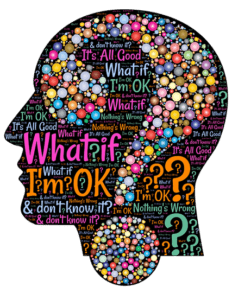Obsessive thoughts can be debilitating and have a profoundly negative impact on our lives. Sufferers of obsessive thoughts often feel powerless to the intrusive and unwanted thought patterns, leading to feelings of helplessness, low self-esteem, and anxiety. Thankfully, there are ways you can manage these intrusive thoughts with the help of cognitive behavioral therapy (CBT) and other evidence-based treatments. In this article, we’ll explore a few different methods for the treatment of obsessive thoughts and how they can help you in managing your symptoms.
Contents
What are Obsessive Thoughts?

Obsessive thoughts are persistent and unwanted thoughts, images, or urges that intrude into a person’s consciousness. These thoughts can be about anything, but they are often about things that the person perceives as dangerous or threatening. Obsessive thoughts can cause a great deal of anxiety and distress and can interfere with a person’s ability to function normally.
There are many treatment options available for people who suffer from obsessive thoughts. Cognitive-behavioral therapy (CBT) is one of the most effective treatments for this condition. CBT is a type of therapy that helps people to change the way they think and behave. This type of therapy can help people to learn how to control their obsessions and compulsions, and how to manage their anxiety. Medication may also be prescribed in some cases, depending on the severity of the condition.
Treatment for Obsessive Thoughts
There are many ways to treat obsessive thoughts, and the best method depends on the individual. Some people may benefit from medication, while others may find relief through therapy or self-help techniques.
For people with milder forms of OCD, self-help techniques may be enough to lessen their symptoms. For example, learning how to relax and manage stress can help reduce obsessive thoughts. There are also several books and online resources that can provide helpful tips for dealing with OCD.
Some of these treatment methods are:
Medications

Many different types of medications can be used to treat obsessive thoughts. The most common type of medication is an antidepressant. Other types of medications that may be used include anti-anxiety medications, antipsychotic medications, and mood stabilizers.
- Antidepressants are the most commonly prescribed type of medication for obsessive thoughts. They work by increasing the levels of certain chemicals in the brain, which can help to improve mood and decrease anxiety. Commonly used antidepressants for treating obsessive thoughts include fluoxetine (Prozac), sertraline (Zoloft), and paroxetine (Paxil).
- Anti-anxiety medications can also help treat obsessive thoughts. These medications work by reducing the amount of anxiety and worry that a person experiences. Commonly used anti-anxiety medications include lorazepam (Ativan), diazepam (Valium), and alprazolam (Xanax).
- Antipsychotic medications are sometimes used to treat obsessive thoughts, although they are not as commonly prescribed as other types of medication. These medications work by reducing the symptoms of psychosis, which can include hallucinations and delusions. Commonly used antipsychotic medications include haloperidol (Haldol) and risperidone (Risperdal).
- Mood stabilizers are sometimes used to treat obsessive thoughts, particularly if a person has a history of bipolar disorder or other mental health conditions. These medications work by stabilizing a person’s mood, which can help to reduce the intensity of obsessive thoughts. Commonly used mood stabilizers include lithium and valproic acid (Depakote).
Therapy
Many different types of therapy can be effective in treating OCD. Cognitive behavioral therapy (CBT) is a type of therapy that is particularly effective in treating OCD. CBT focuses on changing the thoughts and behaviors that are associated with OCD. Exposure and response prevention (ERP) is another type of therapy that is effective in treating OCD. ERP involves exposure to the things that trigger your OCD obsessions, without engaging in the compulsive behaviors that you typically use to relieve anxiety.
Some other therapies that can be helpful include acceptance and commitment therapy (ACT), dialectical behavior therapy (DBT), psychodynamic therapy, family therapy, and mindfulness-based therapies. Each of these therapies can be used to help those with OCD learn more effective ways to manage their symptoms.
Support Groups

If you’re struggling with obsessive thoughts, know that you’re not alone. Many people have experienced what you’re going through and have found help and support through various groups and resources.
One of the most helpful things you can do is connect with others who understand what you’re going through. Support groups provide a safe space to share your experiences, learn from others, and receive emotional support.
There are many types of support groups available, both in-person and online. You can find a group that specializes in obsessions and compulsions or one that focuses on anxiety or depression (which are often comorbid with OCD). You may also want to consider a 12-step program like Alcoholics Anonymous or Narcotics Anonymous.
If you’re not sure where to start, try searching online for an “OCD support group” or “anxiety support group” in your area. You can also contact your local mental health association or psychiatric hospital for more information.
Self-Care
Self-care is an important part of any treatment plan for OCD. It can help to reduce stress, increase your sense of well-being, and give you the strength to keep up with your treatment. Here are some self-care tips that may be helpful:
Get Regular Exercise
One of the best ways to reduce stress is to get regular exercise. Exercise releases endorphins, which are the body’s natural feel-good chemicals. It can also help you stay focused and keep your mood up.
Practice Mindfulness
Mindfulness means being present at the moment and observing your thoughts without judgment or criticism. Practicing mindfulness can help you become more aware of your OCD triggers and be better able to manage them.
Take Time for Yourself
It’s important to set aside time for yourself each day, even if it’s only for a few minutes. This will give you time to relax, do something enjoyable, or practice mindfulness techniques that can help you cope with OCD symptoms.
Eat Healthy Foods and Get Enough Sleep
Eating nutritious foods and getting adequate sleep is essential for overall health and well-being. If you don’t eat healthily or get enough sleep, it can adversely affect your mood and increase your stress levels—both of which can fuel OCD symptoms.
How To Get Treatment for Obsessive Thoughts?

If you’re struggling with obsessive thoughts, some treatments can help. There are many sources to get help for obsessive thoughts and behaviors.
- Talk to a mental health professional: The first step is to talk to a therapist or mental health professional about your obsessive thoughts and behaviors. They can help you identify the underlying causes of your obsessions and provide guidance on how to manage them.
- Visit Hospitals: One of the best ways to get help for obsessive thoughts is to visit a hospital. Many hospitals have specialized programs that can provide treatment and support for people with obsessions.
- Reach out to Support Groups: Another option is to join a support group specifically tailored to those with obsessive thoughts and behaviors. These groups often provide an opportunity for individuals to talk about their experiences and learn from others who are dealing with the same issues.
- Take Recommendations: One of the best ways to get help for obsessive thoughts is to ask people you know who have been through similar experiences and take their recommendations. Some people may be able to recommend a therapist or a support group that has helped them.
Conclusion
Obsessive thoughts can be a difficult challenge to face, but with the right treatment, they can be managed. Cognitive behavioral therapy is an evidence-based approach that has been shown to help people cope with their obsessive thoughts healthily and productively. Additionally, medication may also be needed for more severe cases of OCD to help manage symptoms so that patients are better able to combat their obsessive thought patterns. With the right combination of treatments, people can reclaim control of their lives and live without fear or anxiety.
For more information and guidance, please contact OCDMantra. OCD is a mental health disorder characterized by obsessions and compulsions. If you have any queries regarding OCD treatment, ERP therapy experienced therapists at OCDMantra can help: Book a trial OCD therapy session.


